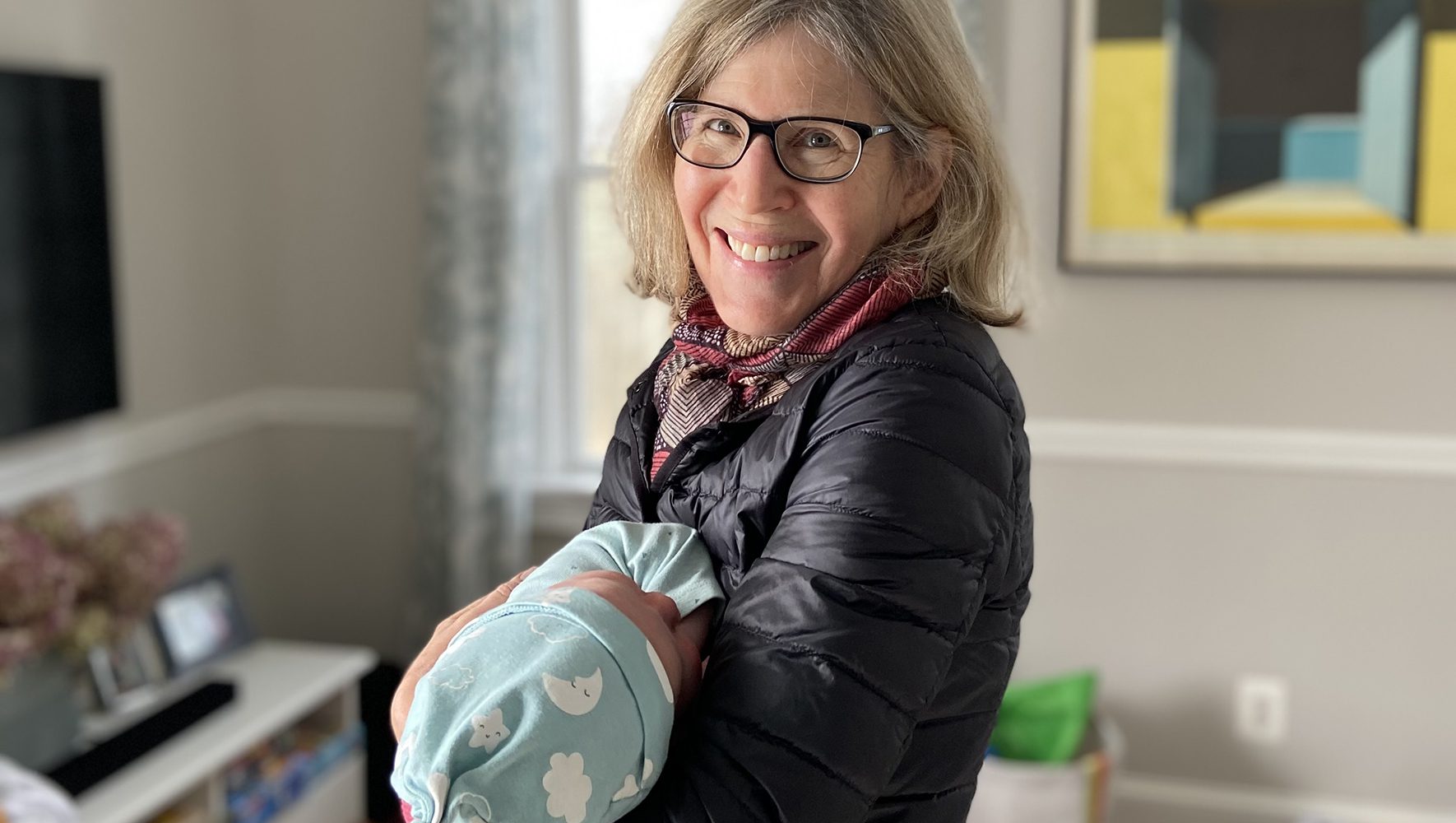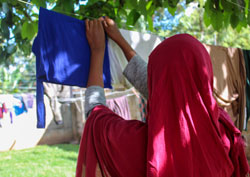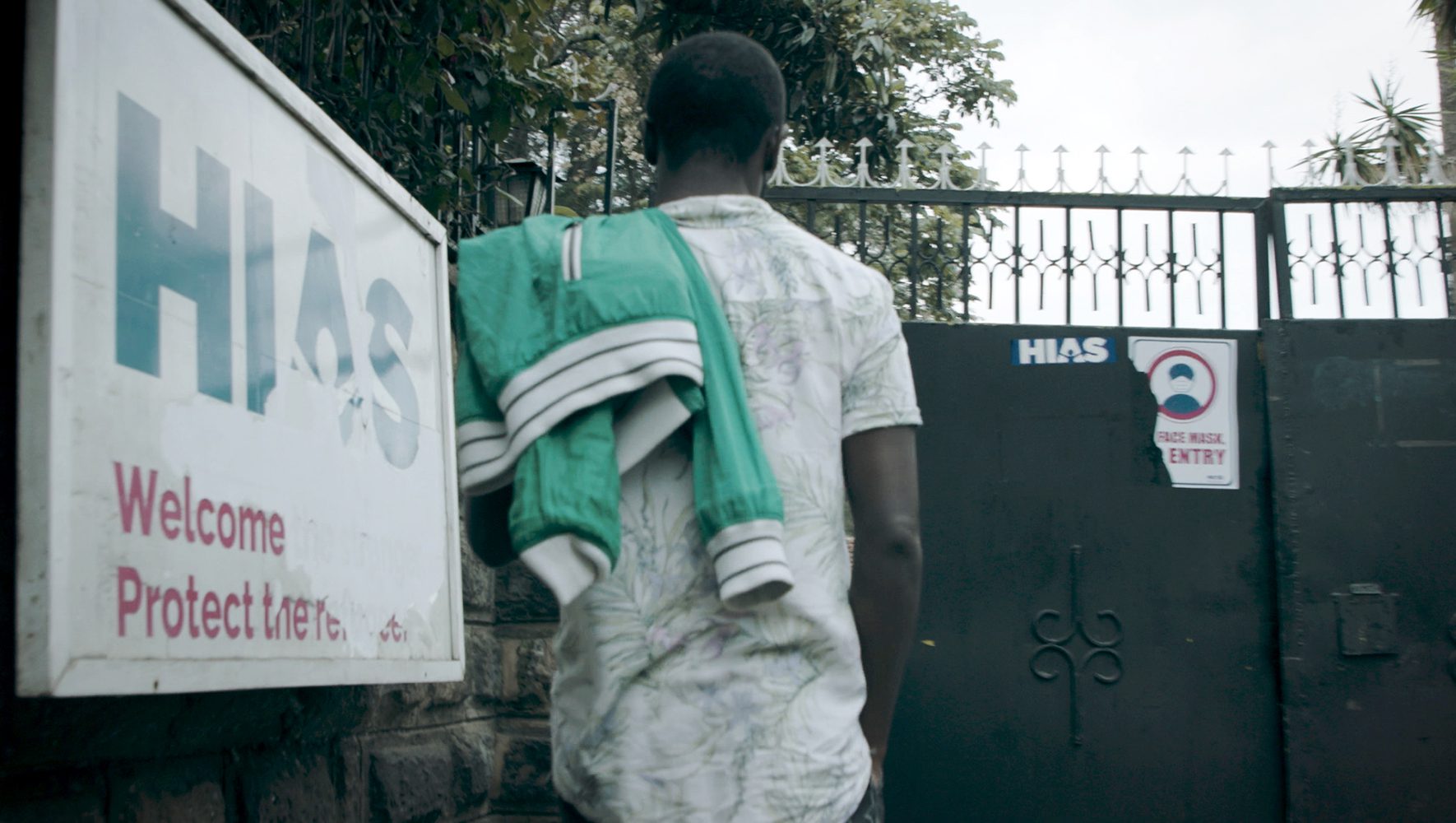Mother and Son Reunited After Three Years Apart
By Talya Nevins, HIAS.org
Jul 31, 2015

Jainaba* and her son Omar* pose for a photo together after three years apart (New York City, 2015).
(Photo courtesy of Jainaba)
“One: If you can run for your life, do it. Two: Whoever gives you guidance, in order to find the right path to follow, always have a talk with your pillow. It works. Go home and do your homework. If you think it might work for you, do it. At the end of the day you will work through it.”
These are the two pieces of advice that Jainaba* would give another person who faced the same challenges that she dealt with back home in Gambia. “I went through a lot of things; but then at the end of the day, I had to stand by myself,” Jainaba told me. As a young teenager Jainaba was subjected to female genital mutilation by elder women in her community and shortly thereafter forced into an arranged marriage with a cousin.
Jainaba’s new husband physically and sexually abused her, forbade her to continue her education, and restricted her from going to work or socializing with friends and family. In 2001—four years after their marriage—her husband left to do business in Libya and left Jainaba behind, alone and pregnant. With her husband gone, Jainaba was finally able to go back to work as a Gambian immigration officer and earn enough money to pay off her marriage dowry and gain some independence. “I was able to move away with my life from one state to another,” Jainaba explained.
Still, her ordeal was not over. Jainaba’s own family demanded custody over her son and threatened to abduct him and bring him to her ex-husband’s family. She reported this to the child welfare department, who informed her family that this would not be tolerated. Insulted that she had involved the authorities, the community called Jainaba to a meeting with the elders and publically beat her to the point of incapacitation.
After a full decade in Libya, Jainaba’s ex-husband returned to Gambia. He was enraged and humiliated to find that Jainaba had remarried, and threatened to kill her if she did not give him custody of their son, Omar*, who was by then 10 years old. Terrified, Jainaba fled to the United States, where she was ultimately directed to approach HIAS for legal consultation.
When she arrived in May 2012, Jainaba began working with HIAS to gain asylum status here in New York City. Simon Wettenhall, lead advocate at HIAS, helped her through the entire process. HIAS has prepared asylum cases for hundreds of refugees like Jainaba over the years, and represents them at U.S. government interviews and immigration court proceedings. Jainaba grew teary-eyed as she explained the ways that HIAS has helped her get her feet on the ground. “It’s because of them that I am regularized. If not, I would be unauthorized to work, I would be unemployed, I could not support myself, let alone my family back home. And here I am today,” she told me.
After meeting Wettenhall at HIAS Jainaba began working as a home health aide, which helped her gain enough money to pay for training to become a certified nursing assistant. Now she works in a nursing home, but hopes to continue her education and become a licensed practical nurse in a hospital. Although there have been many struggles, Jainaba insists that leaving Gambia was the only way for her to feel safe. “Sometimes its not easy, but then you leave your home and you see yourself in a place whereby you get your security. Then you get your mind free,” Jainaba explained when I asked about her adjustment to New York.
The most triumphant moment in these past three years occurred early this summer, when Omar’s immigration paperwork finally processed and he came here to join Jainaba. I had the pleasure of interviewing both Jainaba and Omar just a few weeks after their much anticipated reunion. He landed in New York in May and told me that finally seeing his mother again after three years was the happiest moment of his life. The two of them are currently working on Omar’s insurance application so that he can get the necessary immunizations to begin school in the fall.
Omar, now 13 years old, spent the last three years living with Jainaba’s second husband back in Gambia. Fortunately, family reunification has long been a primary mission at HIAS. Mr. Wettenhall filed for Jainaba to be reunited with her second husband, and the case was approved. The family now awaits permission for their third member to travel to the United States.
When I asked what Omar’s favorite thing in America has been, he dutifully answered “learning.” Then he told me that when he grows up, he’d like to work in an office just like the HIAS conference room where we sat for the interview. Jainaba and I prodded him for what kind of job he’d like to do in this aspirational office. A doctor? A lawyer? Omar nodded yes to both.
While Omar contemplated his future career, I asked Jainaba what she wanted most from her life in New York. “The only thing I want most right now is to go to school. The more you improve yourself, the more you are independent on your own,” she answered. “I would say if my husband were here, my son is here, I am lucky enough to see myself in school, I can upgrade myself and achieve what I want, then I think I’m okay.”
*Names have been changed to protect the family’s privacy.





